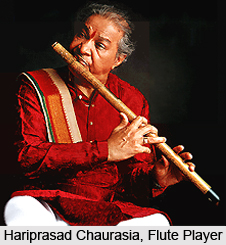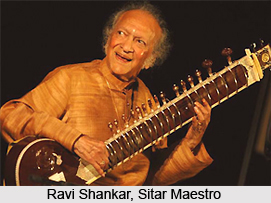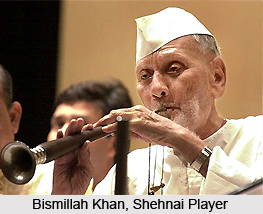 Indian classical instrumentalists include the various skilled practitioners of music who are admired for their timeless musical renditions through several kinds of musical instruments like `rudra veena`, `surbahar`, `sitar`, `sarod`, `sarangi`, `flute`, `shehnai` and `santoor`. Indian classical musical world is one such domain that has been enriched and wholly nourished since ancient times. With a motley of instruments being played while in concert, Indian classical music is enormously respected and admired all round the world. The noted fact that these instruments emote a poignant and heart-wrenching effect from the listener further heightens the effect of classicism on Indian music.
Indian classical instrumentalists include the various skilled practitioners of music who are admired for their timeless musical renditions through several kinds of musical instruments like `rudra veena`, `surbahar`, `sitar`, `sarod`, `sarangi`, `flute`, `shehnai` and `santoor`. Indian classical musical world is one such domain that has been enriched and wholly nourished since ancient times. With a motley of instruments being played while in concert, Indian classical music is enormously respected and admired all round the world. The noted fact that these instruments emote a poignant and heart-wrenching effect from the listener further heightens the effect of classicism on Indian music.
Legendary and sufficiently successful in their extensive career, the Indian classical instrumentalists have been taking India to lofty heights since pre-independence times. It is always believed and a much-discussed fact in India that the classical instrumentalists have been born with the magic touch, whenever they barely touch their respective instruments it sings out as if it has been enchanted. Perhaps the statement is true to some extent, because, each separate musical soiree has turned out even better for the Indian classical instrumentalists. The strum of the string from stringed instruments, or the frequency of wind from winged instruments, readily reaches every nook of the place from where it is being performed.
Ali Akbar Khan
Also known as `Khansahib` or `Ustad` meaning Master, Ali Akbar Khan was a well recognised Hindustani classical musician belonging to `Maihar Gharana` who played the sarod instrument. He set up a music school in Kolkata in the year 1956 and Ali Akbar College of Music in 1967 which is now based in San Rafael, California. He was trained by his father Alauddin Khan and was granted the Padma Vibhushan in 1989.
Hariprasad Chaurasia
Pandit Hariprasad Chaurasia is a reputed exponent of the flute or `bansuri` or the bamboo who was inspired to recite the flute after he heard the flute playing of Pandit Bholanath. He is the recipient of numerable awards including National Award of the Sangeet Natak Academy in the year 1984, the Padma Bhushan Award and Konarak Samman, 1992.
 Zakir Hussain
Zakir Hussain
Born on 9th March, 1951, Ustad Zakir Hussain was a famous `tabla` player and travelled to United States for commencing his international career in the year 1970. His debut solo release `Making Music` was widely appreciated as `one of the most inspired East-West fusion albums ever recorded`. He was the youngest percussionist to be awarded the Padma Shri Award in 1988, the Sangeet Natak Akademi Award by the President of India in 1991 and others.
Pandit Ravi Shankar
Pandit Ravi Shankar is a renowned sitar maestro and amongst the respected legends of the 20th century and belonged to a Brahmin family. He has been referred to as the `Godfather of world music` according to the George Harrison, former guitarist of Beatles. Originally he had ventured into the world of music as a dancer and over a period of time started learning sitar under the leadership of Allauddin Khan.
Dr. L. Subramaniam
Dr. L. Subramaniam is a talented violinist, conductor and composer and is considered to be one of the most scholarly instrumentalists of the country. Though he possessed a doctorate in Medicine, he decided to make music his career, through violin. Comprising Carnatic compositions and symphonies, Dr. L. Subramaniam has over 150 recordings to his credit.
Bismillah Khan
Also revered as `Ustad`, Bismillah Khan was known for popularising the instrument `shehnai`, a wind instrument of the country. He received the prestigious Bharat Ratna award during the year 2001 for being the third reputed classical musician after Ravi Shankar and M.S. Subbulakshmi. Prior to this, the shehnai was mainly employed during traditional social events like weddings and Bismillah Khan raised its status to concerts.
Carnatic Instrumentalists
India has produced innumerable Carnatic musicians who have been praised for their contribution to instrumental music, which is generally popular in southern portion of India. Violinists like M.S. Gopalakrishnan, Dwaram Venkataswamy Naidu, T. N. Krishnan, Lalgudi Vijayalakshmi, etc., plucked string instrumentalists including Challapally Chitti Babu, Jayanthi Kumaresh, N.Ravikiran, R. Prasanna and others, winged instrumentalists consisting of T.R. Mahalingam, Shashank, Sheik Chinna Moulana, etc., percussionists involving Mavelikkara Velukkutty Nair, Arun Prakash, Guruvayur Dorai, Haridwaramangalam A. K. Palanivel and many more.
 Striving hard to reach the respectable position that they have presently gained, the journey was never just a bed of roses for the Indian classical instrumentalists. Some rising from almost pauperism and some fleeing away from home against their guardian`s wishes, the instrumentalists possessed that strong force of determination and will-power to drive forth to success. Witnessing light at the end of the tunnel, the present Indian generation perhaps grossly misses the luminaries that have passed away and can be heard no more. Such is the capability of the instrumentalists that even unheard melodies become sweeter in their fingers and lips. The achievers in the extensive and appreciated list include: Ustad Zia Mohiuddin Dagar, Ustad Asad Ali Khan, Ustad Imrat Khan, Pt. Nikhil Banerjee, Ustad Vilayat Khan, Ustad Allauddin Khan, Ustad Ali Akbar Khan, Ustad Amjad Ali Khan, Ustad Bundu Khan, Pt. Ram Narayan, Pt. Pannalal Ghosh, Ustad Bismillah Khan, Pt. Shiv Kumar Sharma, Rahul Sharma and Pt. Ravi Shankar.
Striving hard to reach the respectable position that they have presently gained, the journey was never just a bed of roses for the Indian classical instrumentalists. Some rising from almost pauperism and some fleeing away from home against their guardian`s wishes, the instrumentalists possessed that strong force of determination and will-power to drive forth to success. Witnessing light at the end of the tunnel, the present Indian generation perhaps grossly misses the luminaries that have passed away and can be heard no more. Such is the capability of the instrumentalists that even unheard melodies become sweeter in their fingers and lips. The achievers in the extensive and appreciated list include: Ustad Zia Mohiuddin Dagar, Ustad Asad Ali Khan, Ustad Imrat Khan, Pt. Nikhil Banerjee, Ustad Vilayat Khan, Ustad Allauddin Khan, Ustad Ali Akbar Khan, Ustad Amjad Ali Khan, Ustad Bundu Khan, Pt. Ram Narayan, Pt. Pannalal Ghosh, Ustad Bismillah Khan, Pt. Shiv Kumar Sharma, Rahul Sharma and Pt. Ravi Shankar.




